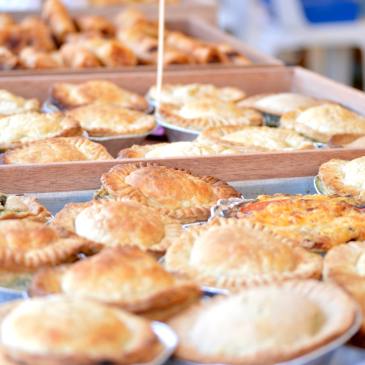Go Ahead and Have Dessert
Body image and diet culture are topics that have been heavy on my mind lately, largely due to the fact that they are in our faces constantly. You don’t really even realize it until you start to look for it, but pay attention to conversations with friends or family, advertisements you hear on television or radio or see on social media, and I can almost guarantee that you’ll be exposed to something that addresses body image and diet culture on more than one occasion. It’s so normalized that we don’t even think about it until something comes out of left field to make us rethink how we approach these things.
In my case, that something is a 12-year-old boy. My youngest son has never been lean and athletic like his older brother; nor has he ever had a metabolism that burns higher than it consumes like his oldest brother (due to heart defects that require his body to work a little harder, though we’ve heard “he’s so lucky he can eat whatever he wants and not gain a pound” so much I could scream). My youngest was the cherubic baby with round cheeks and thigh rolls that just made you want to squeeze them. As he got older, he “slimmed up” as toddlers do, but has always had a bigger build; “husky” if we’re following clothing labels. He has never been medically labeled “overweight” or “unhealthy,” and he has always followed a steady curve along the pediatric growth chart. And he has never been bothered by any of it… until about a year and a half ago when he fairly rapidly gained 10-15 pounds. His nutrition didn’t change. His activity level didn’t change. I was not concerned until he expressed concern. Since he is a very fact reliant kid, I did some research and confirmed what I had been trying to explain to him: This is normal. It happens to most kids in the year or so before puberty fully kicks in, and it’s completely necessary for normal and healthy body development. He is healthy and his body shape and size is unimportant.
This should have been a pretty open and shut case. Problem identified, problem explained, not a problem. But of course it wasn’t. Between the media and middle school peers, my son got so self-conscious about his weight that he started trying to hide his body, being very hesitant to take his shirt off to swim (this was a child that didn’t wear a shirt for probably 5 years of his life). Eventually, he dropped out of Boy Scouts – which he loved – because other boys made fun of his weight. That made me incredibly sad, but what started scaring me was his evolving relationship with food. He started obsessing over food nutrition labels; and while this may not seem like a bad thing (we should be educated about what’s in our food, right?), when any activity hits an obsessive level, it can be pretty dangerous – especially when you don’t really know what you’re looking for. Suddenly I found myself fielding questions like “how many milligrams of sodium is too high for lunch” and “are there too many calories in this soup for me to have a little more?” Soup! It is not ok for a 12-year-old child to be concerned about whether or not the soup he is eating has too many calories!
We started having some pretty tough conversations about trusting our bodies, and how this is something that is not intuitive anymore, but absolutely should be. Our bodies know what they need. They know when they’re hungry and when they’re sated. They know what kinds of food they need. And once upon a time before diet culture and convenience foods, people ate intuitively, because there was no other way. We talked about how health and thinness are not the same thing, and no one should be ashamed of how their body looks because all bodies are different and not an indicator of a person’s character. I tried to explain to him that calories are a unit of energy and not to something to be obsessing over, and it’s ok if he wants to have ice cream in the evening. A 12-year-old kid should be able to enjoy food without constantly beating themself up over it. We all should.
Finally, what kind of parent would I be if I didn’t take some accountability for this whole situation? I could go on about how I don’t know why my child would be so self conscious because I have never obsessed about any of my children’s weight, and that would be true; but what is also true is that he has no doubt heard me comment on my own weight, or likely even on someone else’s. He has heard me say hateful things about my body, or comment on how much weight I’ve gained or need to lose, or turn down treats because as much as I would love to indulge – I don’t need the calories. He has seen and heard me do all the things I am telling him not to.
So I’m actively trying to change the conversation – not just where it concerns him, but overall. I’m making conscious decisions in how I talk about food and bodies – mine, his, and anyone else’s. When we started planning the menu for Thanksgiving dinner, I saw him start to get concerned when I mentioned the desserts. He was already trying to decide which of the three to choose. We went back to the conversation about listening to his body and not eating past when his body says it’s no longer hungry (which is not the same as full), and then, when your body is ready for dessert – go ahead and have a small amount of all three. You don’t have to choose, and you don’t have to feel shame for it.

